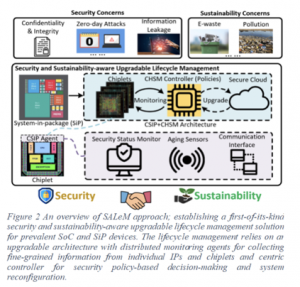(FICS) Florida Institute of Cybersecurity Research makes Transformative Visit to East Africa; Gator Africa Program

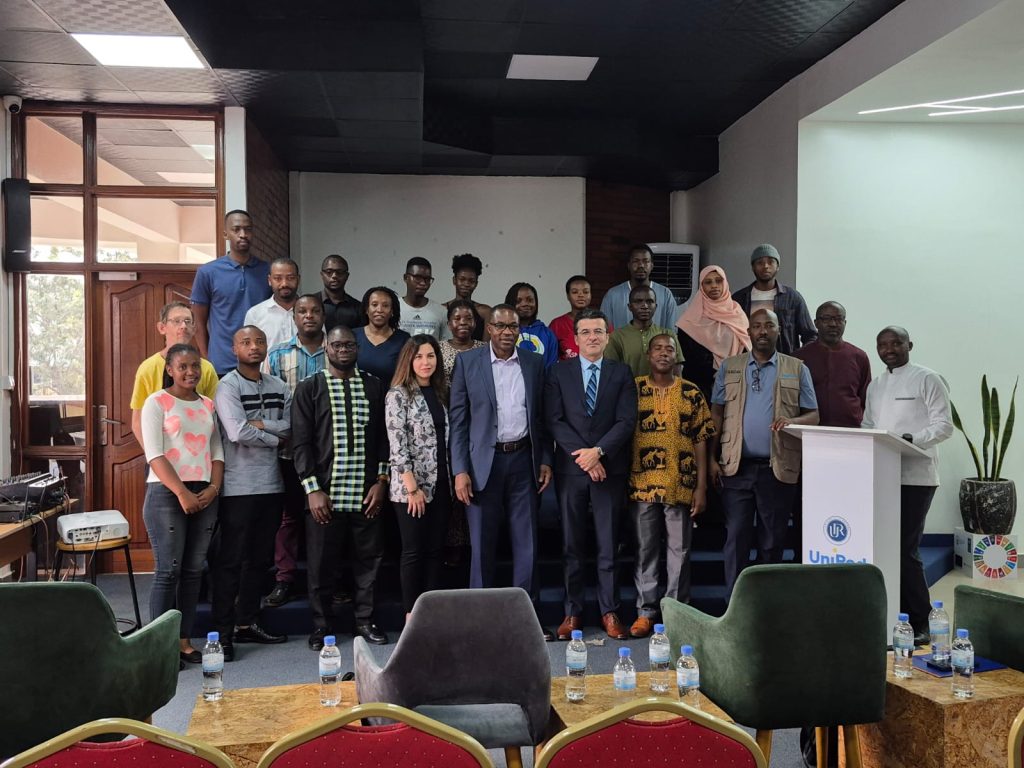
A team of delegates from the University of Florida’s Department of Electrical and Computer Engineering FICS research center embarked on a tour across Kenya and Rwanda. Participants included Dr. Farimah Farahmandi (Associate Director of FICS and Wally Rhines Endowed Professor), Dr. Mark M. Tehranipoor (ECE Chair), Dr. Christophe Bobda (Associate Chair for Academics); the delegation engaged with top academic institutions and government leaders. The goal was to enhance collaborative research with modernized curricula and robust partnerships as part of the Gator Africa initiative.


The team of delegates were welcomed by the Strathmore University School of Computing and Engineering (pictured above) Sciences (SCES) in a meeting centered on developing collaborations in key areas including artificial intelligence, cybersecurity, embedded systems, and sustainable engineering. This exciting exchange of ideas led to outcomes: plans for guest lectures, the drafting of a Memorandum of Understanding (MoU), and a bold shared vision—the establishment of a pioneering tech hub in Nairobi.

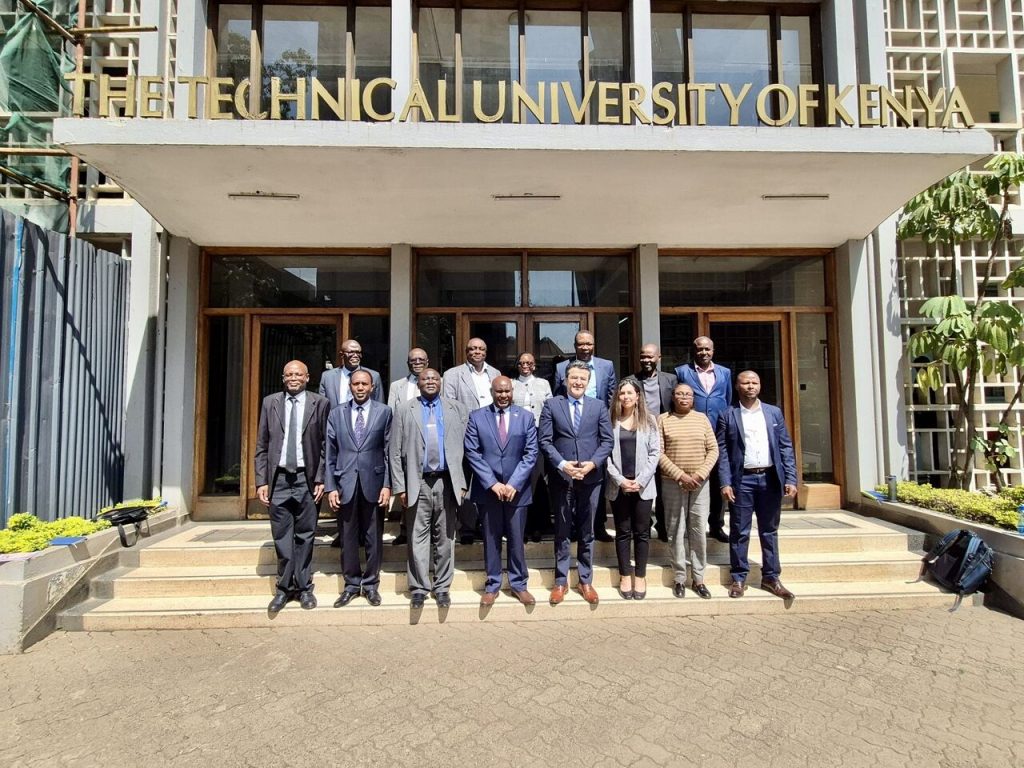
Their journey continued at the Technical University of Kenya (TUK), where the team was honored to meet Prof. Dr.-Ing. Benedict M. Mutua, PhD, Rer. Nat., the university’s Vice Chancellor. High-level discussions were held with deans and faculty from the Faculty of Engineering and the Built Environment (FEBE), delving into the university’s academic programs and setting the stage for joint workshops and the creation of remote laboratories, enabling cross-border research and real-time knowledge exchange.

(Pictured above) A key event of the tour was the delegation’s meeting with Dr. Beatrice Muganda Inyangala, Kenya’s Principal Secretary at the State Department for Higher Education and Research.
The meeting, hosted at the ministry, brought together leading figures from multiple Kenyan universities—including Prof. Margaret Hutchinson (University of Nairobi), Prof. Elijah I. Omwenga (Open University of Kenya), and Prof. Benedict Mwavu Mutua (TUK). Also present were representatives from the U.S. Embassy in Nairobi.
Dr. Christophe Bobda delivered a hands-on seminar at the University of Rwanda, engaging students with cutting-edge instruction in field-programmable gate arrays (FPGAs). The FICS team also visited the African Centre of Excellence in Internet of Things (ACE IoT), learning about local research initiatives and exploring opportunities for collaboration.
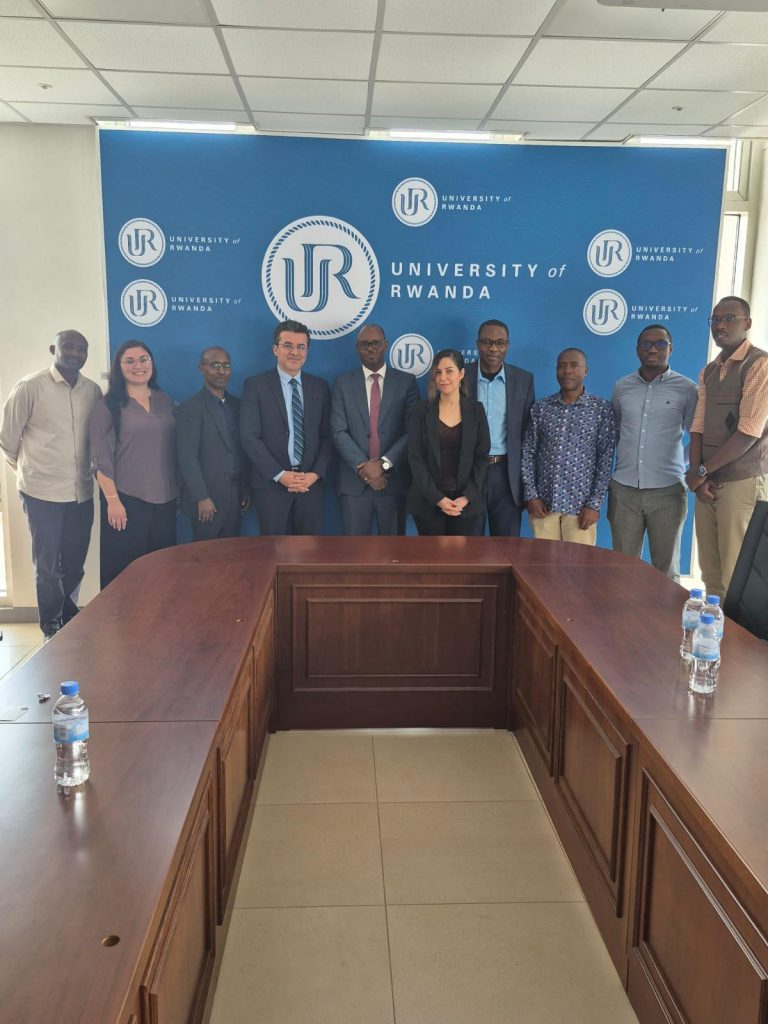
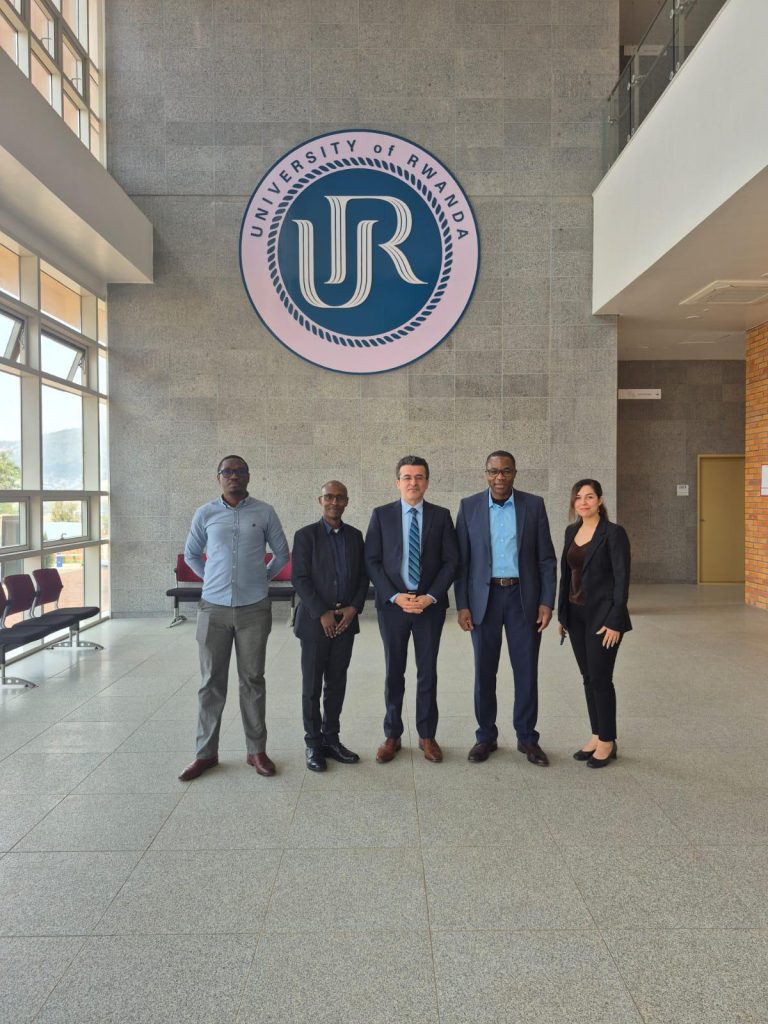
The FICS team of delegates concluded their Nairobi discussions with a productive meeting at the University of Nairobi, hosted by Prof. Siphila Wanjiku Mumenya, Dean of the Faculty of Engineering, and Associate Professor Heywood Ouma Absaloms. Discussions focused on research collaborations and faculty exchange opportunities, reinforcing the foundation for a long-term academic partnership. With deep respect for local expertise and a shared vision for cybersecurity transformation, the team left Kenya and Rwanda with enduring connections and a renewed commitment to global impact in areas of cybersecurity, artificial intelligence, embedded systems and sustainable engineering.
Continued Excellence at DAC: Professor Farimah Farahmandi’s Students Shine on the Global Stage
For the past several years, Professor Farimah Farahmandi‘s research group has made a lasting impact at the Design Automation Conference (DAC)—the premier event in electronic design automation, hardware security, and design innovation. With a consistent record of recognition, publication, and participation, her students continue to exemplify academic excellence and forward-thinking research in the field.In 2024, her student Zahin Ibnat elevated this tradition of excellence as a selected participant in the DAC Young Fellows Program, a competitive initiative designed to support promising young researchers. Zahin distinguished herself further by winning an award for her outstanding video review of the paper titled:
“Beyond Conventional Defenses: Proactive and Adversarial-Resilient Hardware Malware Detection using Deep Reinforcement Learning.”
Her creative and articulate breakdown of this complex topic captured the attention of the DAC audience. The award-winning video can be viewed here, where it continues to inspire students and professionals alike.

The momentum carried into DAC 2025, with Upoma Das making a remarkable impact. Selected to participate in the DAC 2025 Young Fellows Wikipedia Challenge, Upoma contributed to an important article on Hardware Watermarking, a critical area in intellectual property protection. Her efforts were recognized with the P.O. Pistilli DAC Ambassador Award, which included a $1,500 prize, free registration, and a travel grant for DAC 2026 in Long Beach, CA.In addition to this recognition, Upoma’s research was also accepted into the DAC 2025 Ph.D. Forum—a prestigious platform where emerging scholars present their work to industry experts, researchers, and peers.
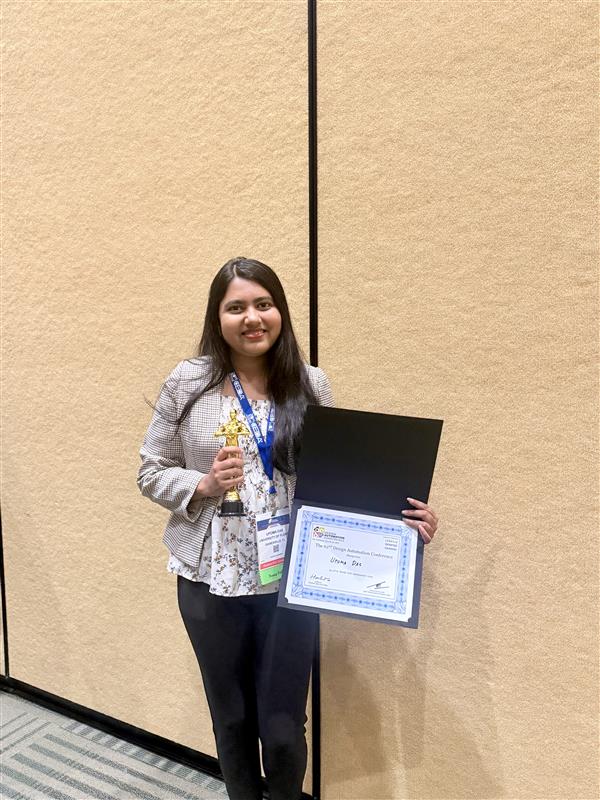
Pramod P. Khargonekar Faculty Award for Excellence
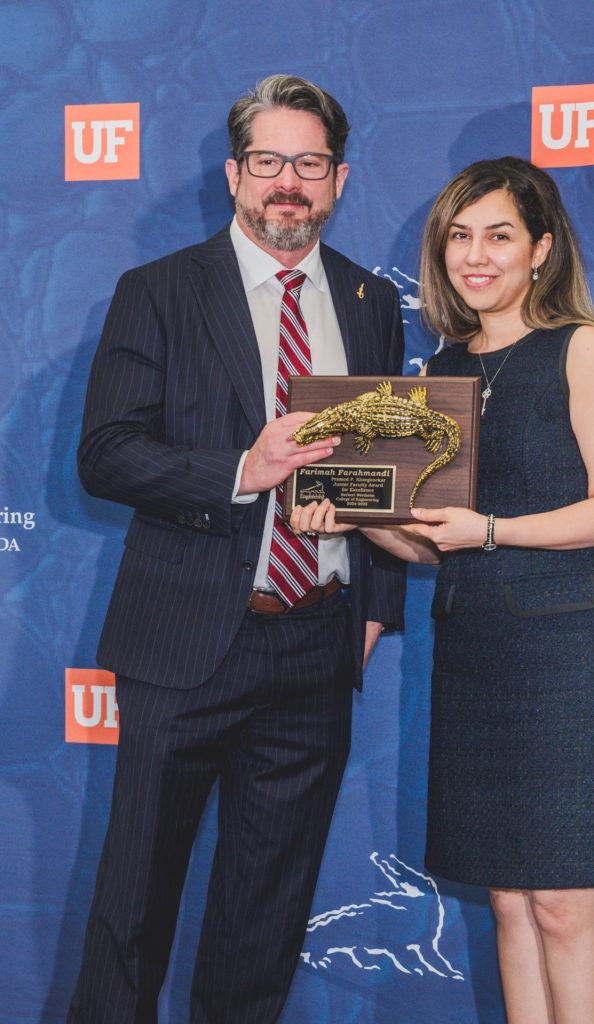
Assistant Professor and Walden Rhines Endowed Professor in Hardware Security, Farimah Farahmandi, was notified that she is the recipient of the 2024-2025 Pramod P. Khargonekar Award for the most outstanding junior faculty member who underwent tenure and promotion review in 2024.
The Khargonekar Award comes on the heels of Dr. Farahmandi’s strongest tenure package for an assistant professor in the history of Herbert Wertheim College of Engineering at the University of Florida. She was the recipient of the National Science Foundation (NSF) CAREER Award, “SAIF: Security Assurance through AI and Formal Approaches for System-on-Chips,” 2024-2029.
The Khargonekar Award is special to ECE Florida—it’s named for Dr. Pramod P. Khargonekar, currently vice chancellor for research at the University of California, Irvine. Prior to his post at UC Irvine, Dr. Khargonekar was Eckis Professor of Electrical & Computer Engineering at UF (2001–2016) as well as the dean of the College of Engineering 2001–2009).
Young UF Faculty Member Racks in the Awards and Fans
The following is the story published by the Herbert Wertheim College of Engineering of the University of Florida about Dr. Farahamndi.

If Grammy Awards were given to faculty, Farimah Farahmandi, Ph.D., would top the nominations list.
Fact is, she is often called “rockstar” in the halls and labs of the University of Florida’s Electrical and Computer Engineering (ECE) department.
Since joining the Herbert Wertheim College of Engineering in 2019, Farahmandi has consistently set a high bar for colleagues, and 2024 was truly a milestone year.
In early 2024, Farahmandi, who received her doctorate degree from UF, received a National Science Foundation CAREER award to support her project SAIF: Security Assurance through AI and Formal Approaches for System-on-Chips. CAREER awards recognize early-career faculty members who are promising researchers and educators.
Farahmandi’s project aims to make microelectronics safer and more secure by developing a cutting-edge artificial intelligence tool that checks the security of modern, highly complex computer chips.
Integrated circuits are critical components in many vital electronic devices and systems, including those used by financial services, military and defense, healthcare, and private business. Such circuits are subject to an ever-growing number of security vulnerabilities and attacks due to their complex functionality and connectivity to the internet. Her framework addresses these vulnerabilities in several ways.
She also plans to integrate research and educational activities by developing a modified curriculum/syllabus for high schoolers, workforce development, minority recruiting, training/workshops for K-12 and undergraduate students, and disseminating research results through publications, seminars, tutorials, and panels.
At the end of the spring semester, the college recognized her with the Excellence Award for Assistant Professors, which is given to professors whose work during the year demonstrates remarkable achievement in research and other scholarly and creative activities.
In May, she was named the inaugural holder of the Walden C. Rhines Endowed Professorship for Hardware Security. That will support her research program, which primarily focuses on hardware security verification and validation.
“Receiving such a prestigious endowment, usually reserved for senior faculty, at this early part of her career speaks highly of Dr. Farahmandi’s accomplishments,” said Mark Tehranipoor, Ph.D, Sachio Semmoto Chair of ECE. “In her community, she is known as an innovator, leader, and outstanding collaborator.”
And as summer started heating up, Farahmandi found herself again being honored with the 2024 Design Automation Conference Under-40 Innovators Award that recognizes up to five young innovators under 40 years old who excel in design and automation of electronics.
Other notable awards include the Young Faculty Award given by the Semiconductor Research Corporation in 2022 and being one of four ECE faculty awarded a US Department of Defense-funded project using cutting-edge technology that plays a pivotal role in the development and validation of complex hardware and software systems. These systems enable engineers to emulate and test their designs before the lengthy step of building physical prototypes. She accomplished this while being named the Yangbin Wang Rising Star Endowed Assistant Professor in 2023.
“Farimah has been incredibly successful in building and running an impressively large and dynamic research group with projects she’s won from federal agencies and industry partners,” said Philip Feng, Ph.D, Wally Rhines endowed professor and associate chair for research in the department for Electrical and Computer Engineering. “She has exceptional visibility, like a rock star, in her field, as a prolific young researcher and scholar.”
She received her bachelor’s and master’s degrees from the Department of Electrical and Computer Engineering at the University of Tehran, Iran in 2010 and 2013, respectively.
Farimah Farahmandi Named a Top Innovator in DAC’s Under 40 Innovator Awards
Farimah Farahmandi, Assistant Professor of electrical and computer engineering at the University of Florida, is one of five recipients of the 2024 Under-40 Innovator Award from the Design Automation Conference (DAC).
DAC is the largest industry event devoted to electronic computer-aided design. The award recognizes the top five young innovators who have made a significant impact in the field of electronics design and automation. Young innovators are redefining and shaping the future of the design automation field in industry, research labs, start-ups and academia, and DAC recognizes the best and brightest. Each year, the Design Automation Conference names the top five young, global innovators in the field of electronic design automation. One June 23rd, Farahmandi became one of the top researchers selected to receive the award.
Farahmandi’s cutting-edge research has earned her a reputation as a dedicated, influential researcher in the hardware security community. She is widely recognized for her work. Her research program thrives, focused on hardware security verification and validation, by extending it to AI-based approaches to ensure the security in microelectronics in pre and post fabrication stages. She is globally known for her pioneering research in the field of security verification. Her research will establish security, safety, and reliability of system-on-chips (SoCs) and system-in-packages (SiPs) deployed to modern critical industrial and DoD applications.
Farahmandi Named Walden C. Rhines Endowed Professor for Hardware Security
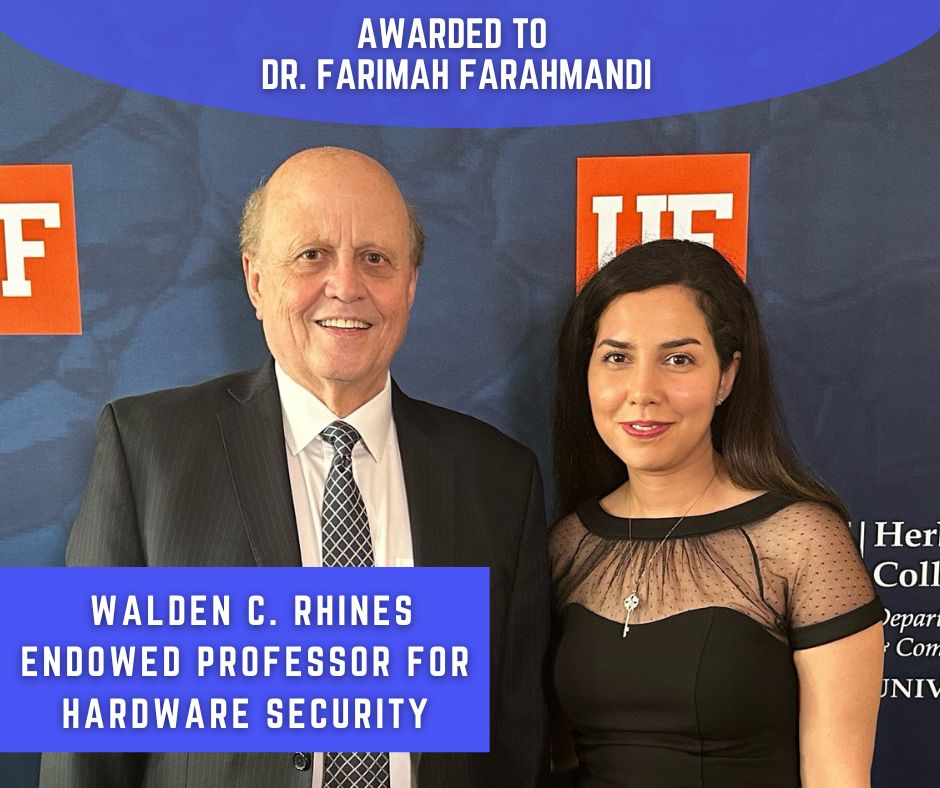
Dr. Farimah Farahmandi, ECE Assistant Professor and Associate Director of Florida Institute for Cybersecurity (FICS) at the University of Florida, has been named as the inaugural Walden C. Rhines Endowed Professor for Hardware Security. She is the first ever Associate Professor that has been bestowed with this distinction. The endowment will support Dr. Farahmandi’s research program, focused on hardware security verification and validation, by extending it to AI-based approaches to ensuring the security in microelectronics in pre and post fabrication stages. She is globally known for her pioneering research in the field of security verification. Her research will result in establishing security, safety, and reliability of system-on-chips (SoCs) and system-in-packages (SiPs) deployed to modern critical industrial and DoD applications.
Dr. Walden Rhines, who is continuing his father’s philosophy that “outstanding people want to work with other outstanding people,” created this endowment to support Dr. Farahmandi’s research and to support the department’s vision of growing security and trust in modern microelectronics that impacts our everyday’s life. Dr. Mark Tehranipoor, ECE Department Chair states, “Receiving such a prestigious endowment at this early part of her career, while usually this endowment is reserved for much more senior faculty in the college, speaks highly of the accomplishments made by Dr. Farahmandi. She is an innovator, leader, and outstanding collaborator to many in the college and in the community.”
Dr. Rhines is currently the President and CEO of Cornami, Inc., a fabless software/semiconductor company focused on intelligent computing for fully homomorphic encryption and machine learning. He was previously CEO of Mentor Graphics for 25 years and Chairman of the Board for 17 years. During his tenure at Mentor, revenue nearly quadrupled and market value of the company increased 10X.
Prior to joining Mentor Graphics, Dr. Rhines was Executive Vice President, Semiconductor Group, responsible for Texas Instruments’ (TI) worldwide semiconductor business. During his 21 years at TI, he was President of the Data Systems Group, held numerous semiconductor executive management positions and was directly responsible for the creation and growth of the digital signal processing business which eventually comprised about 50% of TI’s total revenue.
Dr. Rhines holds a Bachelor of Science degree in engineering from the University of Michigan, a Master of Science and Ph.D. in materials science and engineering from Stanford University, a master of Business Administration from Southern Methodist University and Honorary Doctor of Technology degrees from the University of Florida and Nottingham Trent University.
Dr. Rhines grew up in Gainesville, and despite his many years elsewhere, his heart remains firmly rooted in Gainesville. Dr. Rhines’ father, Frederick Rhines, was the founder of UF’s Department of Materials Science and Engineering. His love of Gainesville is evidenced by the support which the Rhines Foundation provides the University of Florida.
FARAHMANDI RECEIVES “EXCELLENCE AWARD FOR ASSISTANT PROFESSORS in College of Engineering and University Level
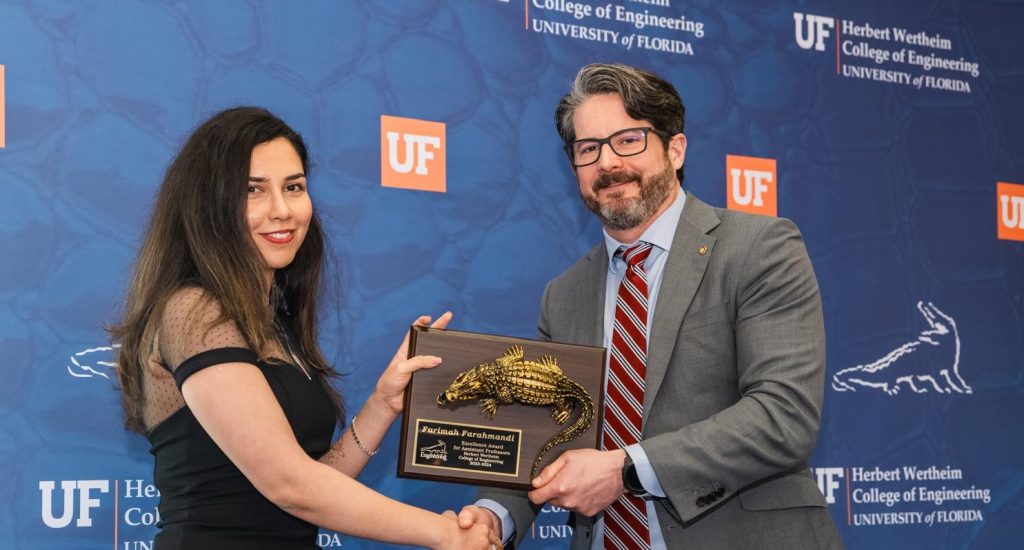
At the Herbert Wertheim College Of Engineering Faculty and Staff awards luncheon held recently, Farahmandi was recognized with the honor of receiving the “Excellence Award for Assistant Professors.” Excellence Awards for Assistant Professors or is a one-time allocation in support of research. This award is conferred upon an Assistant Professor whose research performance during the year demonstrates remarkable achievement in research and other scholarly and creative activities at the highest level.
FARAHMANDI RECEIVES NSF CAREER AWARD FOR AI-ASSISTED SECURITY VERIFICATION FRAMEWORK
Yangbin Wang Rising Star Endowed Assistant Professor Farimah Farahmandi has received an NSF CAREER award in support of her project “SAIF: Security Assurance through AI and Formal Approaches for System-on-Chips.” The project seeks to enhance the safety and security of microelectronics by creating an innovative AI-assisted security verification framework for modern complex system-on-chip (SoC) devices.
Integrated circuits are critical components in many vital electronic devices and systems, including those used in financial services, military and defense applications, healthcare systems, and business operations. Such circuits are subject to an ever-growing number of security vulnerabilities and attacks due to their complex functionality, increased interactions among numerous functional blocks, and connectivity to the internet.
Dr. Farahmandi’s SAIF framework aims to address these vulnerabilities in a number of ways. The AI-assisted framework seeks to provide high verification coverage while dramatically reducing the time required to verify the integrity of micro devices like SOCs. By taking humans out of the process and leveraging the power of AI, the SAIF framework is able to lower security verification time by orders of magnitude while providing scalability of circuit complexity. SAIF provides computer chip design and verification engineers with properties and tools to check for security vulnerabilities before fabrication and the system promises to be extremely adaptable as new attack surfaces and modalities are discovered.
This project will integrate research and educational activities by developing a modified curriculum/syllabus for high schoolers, workforce development, minority recruiting, training/workshops for K-12 and undergraduate students, and disseminating research results through publications, seminars, tutorials, and panels.
FARAHMANDI WORKS TO OPTIMIZE CHIP LIFECYCLE MANAGEMENT
Yangbin Wang Rising Star Endowed Assistant Professor Farimah Farahmandi has received funding from the Office of Naval Research in support of her project “Optimized System Design for Assurance and Life-cycle Management (SaLEM).” The objective of the $498K project is to develop a sustainable and security-aware life-cycle management solution, called SALeM, that monitors the run-time behaviors and silicon status of microelectronic devices. The team will also develop novel designs for upgradable hardware, meaning that the design can be altered and enhanced during runtime.
SaLEM is a first-of-its-kind optimized system designed for assurance and lifecycle management. It is intended to address key sustainability and security concerns in semiconductor manufacturing while enhancing device sustainability and mitigating e-waste issues. A key feature of the SALeM system is fine-grained monitoring to enable run-time security monitoring and in-field upgrades. The monitoring is accomplished by distributed monitoring agents, essentially sensors embedded in the hardware. The monitoring agents collect and report data (e.g., aging status) from chiplets which is then transmitted to a reconfigurable fabric, an embedded FPGA (eFPGA), for further analysis. The sensors provide meticulous observability in security-critical areas, while reconfigurable hardware-based controllers offer adaptability in deploying dynamic security policies against sophisticated attacks like zero-day threats. This detailed level of data monitoring and communication will enable the recovery of systems in the field and over-the-air hardware security updates, greatly enhancing overall device security, reducing the frequency of device replacement, and enabling device reuse.
By focusing on reducing device replacement frequency, extending device lifespan, and enabling device reuse for diverse applications, SALeM aims to mitigate sustainability challenges and supply chain disruptions. The methodology shows great potential for semiconductor manufacturing, highlighting a strategy for the integration of advanced monitoring capabilities into future products.
Dr. Farahmandi’s SaLEM project continues her work in the national security space by creating trustworthy and sustainable electronics for secure and reliable hardware used in military and naval systems, the aerospace industry, financial systems, and automobile systems. Both semiconductor manufacturing companies and OEM companies stand to benefit from this research.
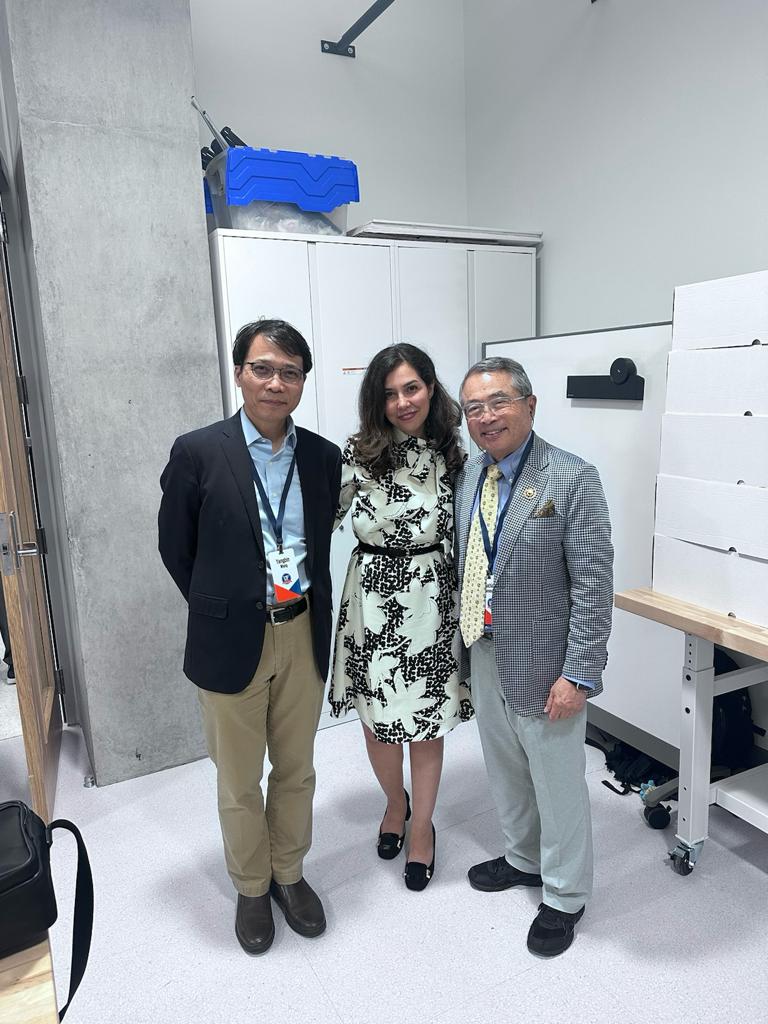
Photo below: “Open House SiLDA Lab” Doctoral student, Dipayan Saha, discusses Synopsis ZeBu Emulation Platform with curious visitor. Nov. 2023
Silicon Design and Assurance Lab (SiLDA): A Research Incubator for Cybersecurity Testing and Assurance
Photo on Left: Dr. Farimah Farahmandi (center), Yangbin Wang Rising Star Endowed Professor and Assistant Professor at the University of Florida along with Dr. Yangbin Wang (left) and Sachio Semmoto (right) celebrate the ribbon cutting ceremony. Nov 2023
Published on 02/17/2023
Launching this month, Dr. Farahmandi’s lab, the Silicon Design and Assurance Lab (SiLDA) opened its doors for students and fellows to study and collaborate in Malachowsky Hall. This lab will serve as an incubator facilitating the development of groundbreaking, interdisciplinary work.
Housed in the new Malachowsky Hall for Data Sciences & Information Technology, the SiLDA Lab offers the latest technology and equipment designed for testing and hardware assurance.
Our Main Research Field
Over the past decades, integrated circuits (ICs) have become ubiquitous in numerous applications ranging from high-end data centers to low-power terminals. On the other hand, the security and assurance of microelectronic systems become paramount to preserve the confidentiality, integrity, and availability of sensitive data, calling for more and more research efforts from both industry and academia. At the University of Florida, the Silicon Design and Assurance Lab (SiLDA) led by Dr. Farimah Farahmandi strives to develop cutting-edge solutions for assessing security vulnerabilities of IC designs and enhancing system resilience against the most threatening attack vectors.


Cutting Edge Equipment
Our lab (lab 3229 in UF Malachowsky Hall) is equipped with leading security inspection instruments and experts with analysis capabilities including but not limited to (i) Security bugs emulation. For timely security closure, we have the Synopsys ZEBU emulation platform. It consists of reconfigurable devices which can accommodate the logic of the most recent processors such as Apple CPUs or Nvidia GPUs. As such, the security verification can be confirmed on real silicon while being accelerated by orders of magnitude. (ii) Medical device security. The security of medical devices greatly impacts the life safety of patients. We investigate the potential effects of physical disturbance (e.g., EM emissions from smartphones) on critical devices such as heart pacemakers. (iii) Side-channel security. Side-channel attacks can non-invasively deduce security assets from the physical properties (e.g., power, electromagnetic) of a running IC. Our lab has the pre-silicon and post-silicon platforms to prototype arbitrary cryptographic implementations for both power and EM side-channel vulnerability quantification. Specifically, our lab is equipped with quite a few ChipWhisperer instances (CW305, CW Pro, etc.) and Langer EM probing instruments (e.g., RF-K 7-4 H-field probes) for power and EM side-channel security verification, respectively.(iv) Fault injection security. Fault injection attacks can effectively compromise data and system integrity during run-time. For the security assessment of such attacks, we have a Riscue laser station to enable most fine-grained bit-flips on target devices. (v) Testing and probing for security verification.

The SiLDA Lab also has the capability to identify security vulnerabilities from post-silicon (commercial-off-the-shelf) devices through testing and probing instruments. Feeding directed test vectors or directly inspecting the internals of suspected ICs using our techniques minimizes the possibility of vulnerabilities escape.

Farahmandi Receives DURIP Award from AFOSR
Published on 02/17/2023
Dr. Farimah Farahmandi has received a DURIP grant award for $290k in funding from the Air Force Office of Scientific Research in support of her efforts to equip the Silicon Design & Assurance (SiDA) lab with the ZeBu Emulator framework, manufactured by Synopsys. ZeBu, short for “Zero Bugs Emulation,” is a cutting-edge technology that plays a pivotal role in the development and validation of complex hardware and software systems enabling engineers to emulate and test their designs before the lengthy step of building physical prototypes.
A critical issue in the current globalized semiconductor manufacturing sector is hardware security and trust assessment. As the bulk of manufacturing in the sector has long been outsourced to offshore foundries, the authenticity of the final manufactured products has become harder and harder to ascertain. The increasing complexity of modern integrated circuits and system-on-chips has only made the problem worse. Additionally, many unintentional security vulnerabilities may arise during the design process of SoCs/ICs due to their high complexity, lack of efficient and comprehensive security verification efforts, diversity of critical assets, and EDA tools that are not aware of security requirements.
The use of an emulation tool like ZeBu allows developers and researches to significantly accelerate the product development cycle, minimizes security risks associated with potential security vulnerabilities and bugs, and reduces the cost of diagnosis and patching. By providing a virtual environment that closely replicates the target hardware, ZeBu empowers hardware security researchers to detect security vulnerabilities early in the development process, resulting in more secure and trustworthy end products.
The SiLDA Lab
The SiLDA Lab supports five postdoctoral fellows, thirteen PhD students, and many master and undergraduate researchers in the area of hardware security verification and validation (SV&V). With the addition of the ZeBu framework to her lab, Dr. Farahmandi hopes to help her students develop skills in various aspects of hardware security and trust, including trustable hardware, counterfeit detection, security primitives, side-channel attacks and countermeasures, and reverse engineering. Moreover, acquiring the ZeBu Emulator will enable Dr. Farahmandi’s research group to develop virtual labs to promote interest from undergraduates and high school students.
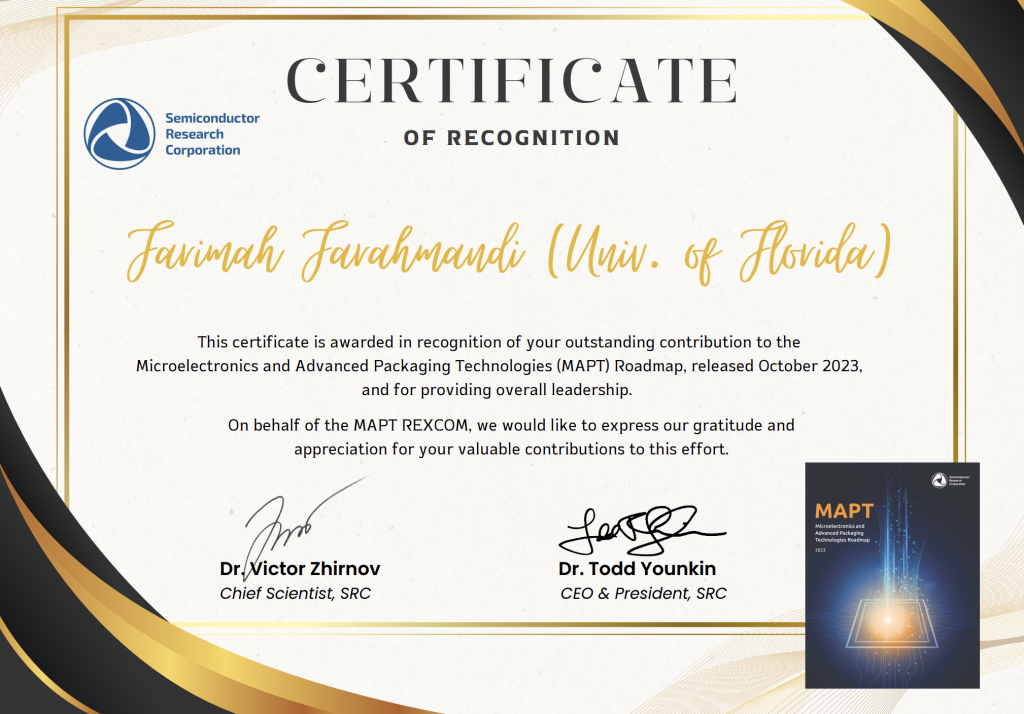
Farahmandi receives Certificate of Recognition from SRC
Published on 02/17/2023
This certificate has been awarded to Dr. Farimah Farahmandi in recognition of her outstanding contribution to the Microelectronics and Advanced Packaging Technologies (MAPT) Roadmap, released October 2023, and for providing overall leadership. Dr. Farahmandi has led the discussions regarding the security concerns of heterogenous integration in Microelectronics and Advanced Packaging Technologies (MAPT) Roadmap. Read the press release here
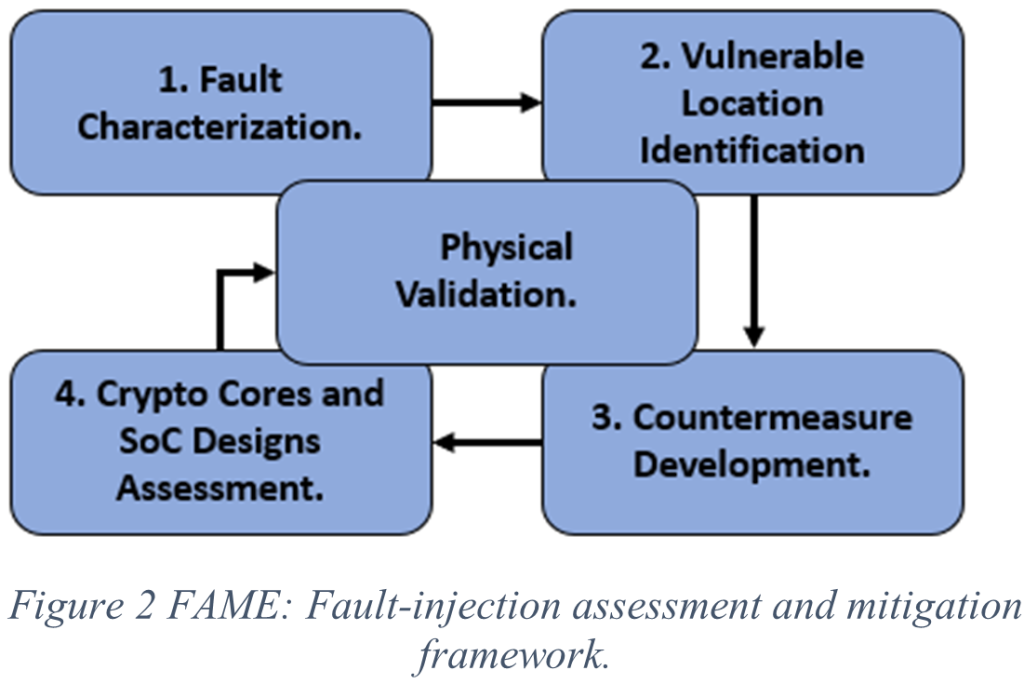
Farahmandi receives $600k grant for fault-injection research
Published on 02/17/2023
ECE Assistant Professor Farimah Farahmandi has received funding from the Office of Naval Research (ONR) in support of her 3-year project, “FAME: Fault-Injection Assessment and Mitigation of Microelectronics at Pre-silicon.” The $600k grant supports work which aims to counter fault-injection attacks by discovering the most vulnerable locations in order to develop more efficient solutions for bolstering physical protection. Read more…

FARAHMANDI RECEIVES $500K DARPA GRANT TO ENHANCE CHIP SECURITY, SPEED TIME TO MARKET
Published on 08/03/2021
ECE Assistant Professor and member of the Florida Institute for Cybersecurity (FICS) Research Farimah Farahmandi has been awarded a $500K grant from the Defense Advanced Research Projects Agency (DARPA) for her project, “Security-Aware High-Level Synthesis (SHINE).” Read more…
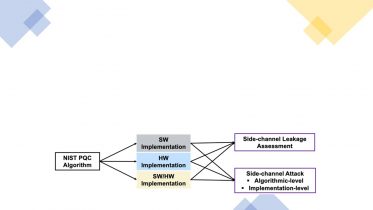
FICS Research Collaborates with NIST on Evaluating Side-Channel Attacks on Post-Quantum Cryptography
Published on 07/09/2021
In 2016 the American National Institute of Standards and Technology (NIST) started a post-quantum cryptography (PQC) standardization process for key encapsulation mechanisms (KEM) and digital signature schemes. The competition began with 69 proper submissions in December 2017. Read more…

ARM/SRC Supports Prof. Farimah Farahmandi to Develop Secure and Extensible SoC Architecture
Published on 07/09/2021
With the ubiquitous use of IoT devices in all walks of life, SoCs are subjected to various attacks to extract security assets throughout their lifecycle. Arm has an architected and evolving family of secure enclave implementations possessing a variety of security services and capabilities together that aim for attack mitigation and countermeasure techniques that are integrated into the overall secure SoC lifecycle. Read more…
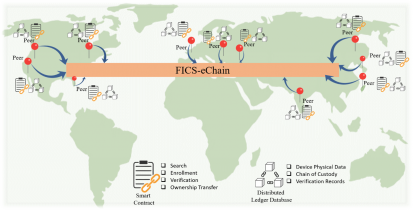
FICS-eChain: Enabling End-to-End Protection of Electronics Devices and Systems
Published on 04/20/2021
In the modern digital era, counterfeit electronic devices and systems pose a severe threat to undisruptive service, users’ privacy as well as the national economy, and security. Adversaries can inject various counterfeit devices into the electronics supply chain due to its global and distributed nature and sheer operational complexities among numerous participants, which lacks distinct provenance, tracking, and traceability of the products from individual chips to large systems. Read more…

DR. FARAHMANDI TO PRESENT AT TEDX
Published on 03/09/2021
TEDxYouth@PHUHS, an independently organized TED event to be held at Palm Harbor University High School April 18, will feature ECE Assistant Professor Farimah Farahmandi. The event, branded ‘Rewired,’ invites 12 speakers to share what it means to rewire our world. Read more…
